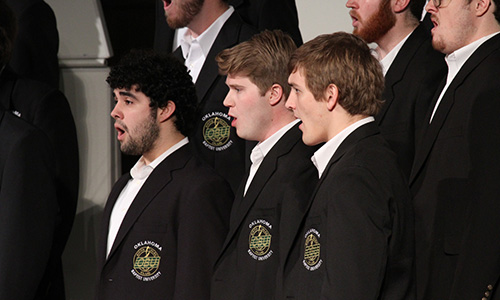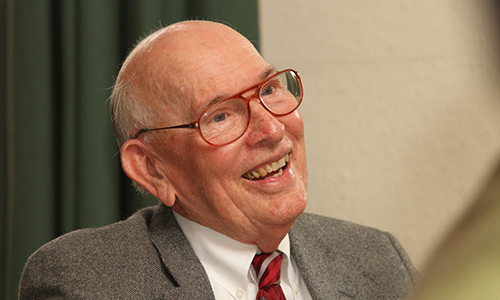Terry Lauds Key 'Founders' in OBU History Address
February 6, 2013
Drawing from his 13 years as OBU historian -- with decades more experience in campus administration -- J. Thomas Terry led the OBU community in celebrating its 103-year history during a special Founders' Day chapel service Wednesday, Feb. 6, in Raley Chapel's Potter Auditorium.
The purpose of Founders' Day is to remember and give thanks for the founding and founders of OBU. In his address, Terry noted several faculty and staff throughout the university's history who made important contributions to the future of the school.
"In their way, they could be thought of as 'founders' because of the impact of their ideas and actions," he said.
Terry recounted how the City of Shawnee came to exist, beginning with Etta Ray and Henry Beard, who participated in the Oklahoma land run on Sept. 22, 1891. The couple worked alongside J.T. Farrall to charter the town of Shawnee in 1894.
For chapel messages, follow this link.
Within 15 years, an area of Indian Territory once covered in trees became a community with three railroads and 42 passenger trains per day serving the town. In 1906, the Baptists of Oklahoma Territory and Indian Territory met in Shawnee and voted to join together as the Baptist General Convention of Oklahoma. One of the group's resolutions formed an Education Committee which recommended, in 1907, that a new Baptist university be established.

Bison Glee Club members (from left) Trevor Rodman, Davis Simmons and Evan Blackburn sing "If God is For Us" during OBU's Founders' Day on Wednesday, Feb. 6.
After considering locations, including Lawton, El Reno, Sulphur and Oklahoma City, the committee accepted an offer from Shawnee's Chamber of Commerce of 60 acres of land for a campus and $100,000 to construct a building on the property. Today, the offer would be valued at about $2.5 million.
On Feb. 9, 1910, the Secretary of State issued a charter to the Baptist University of Oklahoma. The name was changed to Oklahoma Baptist University in 1919. Shawnee Hall was completed at a cost of $140,000, and classes began in September 1915.
"Over the next 25 years, OBU had good and bad times," Terry reported. "The 1918 flu epidemic kept the campus quarantined for two months. World War 1 took many of the male students. After the war was over the football and track programs excelled. The school band played at football games and on other occasions. Student debaters were successful. OBU developed a good reputation among the colleges in Oklahoma."
Terry pointed to the foresight and tenacity of Berta Kay Spooner, executive director of the Woman's Missionary Union of Oklahoma, who mobilized the women of Oklahoma Baptist churches to raise funds for a new women's dormitory on campus. More than 4,000 people, 400 organizations and about half the Baptist churches in Oklahoma donated funds to the effort, with only three gifts exceeding $500. Completed in less than eight months, the WMU Memorial Dormitory opened in the fall of 1928.
With the advent of World War II, OBU's enrollment dropped to 368 students because many male students were drafted into military service. Through the efforts of Dr. John Raley, OBU's president from 1934-61, the university contracted with the United States Army to be a military training site. In 1943-44, more than 2,000 Army Air Corps students were trained on Bison Hill.
"This program not only saved faculty and staff jobs, it allowed OBU to assist in the war effort, and was an opportunity for people all over the nation to become acquainted with Oklahoma Baptist University," Terry said. "This action on the part of the OBU president was instrumental in expanding the diversity of the OBU student body, so that today students studying at OBU come from 37 states and 26 countries."
Terry noted the contributions of 1950 OBU graduate Bob Bass, who returned to coach the Bison basketball team to the 1966 NAIA National Championship, for founding a legacy that continues to inspire OBU sports teams today. He lauded the work of former OBU athletic directors David Sallee, Bobby Canty and Norris Russell for their foundational work in the opportunities afforded to Lady Bison athletes since 1972.

Terry visits with friends during a luncheon following OBU's Founders' Day.
In academics, Terry applauded the efforts of Oklahoma native Juanita Millsap, a founder of the bachelor of nursing program at OBU - the first of its type in Oklahoma. Beginning in 1952 with 10 students and three clinical faculty members, OBU's highly regarded program currently has 237 students in the College of Nursing who are taught by 10 clinical faculty members and the dean. In Fine Arts, Terry relayed the initiative of Mary Kay Parrish, who served on the OBU faculty from 1964-2002, with founding a nationally recognized hand bell program. Parrish remains in demand as a hand bell clinician and composer.
Terry credited Donald G. Osborn, a 1951 OBU graduate and former Marine, with utilizing his role as vice president for student development to champion the policy of including students as voting members of university committees, a practice that continues today. William E. Neptune, a 1950 OBU graduate, utilized his role as dean of the college of arts and sciences to explore better ways to present information to students. His work was foundational in building the framework of OBU's unified studies curriculum.
When Dr. Bob Agee became OBU's 13th president, he was impressed that the number of OBU graduates serving on foreign mission fields exceeded those of every other college in the world. Wanting current OBU students to also engage in missions endeavors, Agee worked alongside the Baptist Student Union and the School of Christian Service staff and faculty to create mission opportunities around the world. Agee's foresight helped found the missions programs on campus today, Terry said.
Terry drew attention to OBU's Student Success Center, started in 2008 under the leadership of 1988 alum Monica Mullins, with the goal of transforming students into scholars by equipping them to pursue academic excellence in a way that integrates their faith with their studies. During the fall of 2008, the Center logged 1,467 student visits. In fall 2012, there were more than 5,000 student visits, an increase of almost 350 percent. The contributions of Mullins, Shawnee benefactors Ann and Paul Milburn and many others will have a lasting impact on OBU's students, Terry said.
"There are many others who could have been included in this recognition on Founder's Day," Terry said. "As you can see, it takes a person or group to have ideas and be tenacious in bringing them to fruition. The founders of OBU created a dynamic organization whose influence and reach would be viewed with extreme pleasure by those who advanced the idea over 100 years ago of creating a Baptist University."
"We owe a debt of gratitude to the people who have worked to make OBU the great school that it is today," he said. "I look forward to seeing how God will bless OBU in the future."